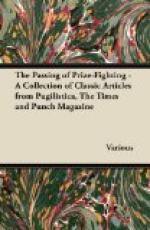Yates was nearly treating the enlightened British public with an antidote to “the vast receptacle of 8,000 tons of water,” by setting fire to the saloon chimney. Great as the consternation of the audience was in the front, it was far exceeded by the alarm of the actors behind the curtain, for they are so sensible of the manager’s daring genius, that they concluded he had set fire to the house in order to convert “the space usually devoted to illusion into the area of reality.” The great Mr. Freeborn actually rushed out of the theatre without his rouge. Little Paul drank off a glass of neat water. Mr. John Sanders was met at the end of Maiden Lane, with his legs thrust into the sleeves of his coat, and the rest of his body encased in the upper part of a property dragon; whilst little round Wilkinson was vainly endeavouring to squeeze himself into a wooden waterspout. Had he succeeded he might have applied for the reward offered by the Royal Society for a method of
[Illustration: SQUARING THE CIRCLE.]
* * * * *
THE CRIMES OF EATING.
[Illustration: S]Sir Robert Peel and her Majesty’s Ministers have, we learn, taken a hint in criminal jurisprudence from his Worship the Mayor of Reading, and are now preparing a bill for Parliament, which they trust will be the means of checking the alarming desire for food which has begun to spread amongst the poorer classes of society. The crime of eating has latterly been indulged in to such an immoderate extent by the operatives of Yorkshire and the other manufacturing districts, that we do not wonder at our sagacious Premier adopting strong measures to suppress the unnatural and increasing appetites of the people.
Taking up the sound judicial views of the great functionary above alluded to, who committed Bernard Cavanagh, the fasting man, to prison for smelling at a saveloy and a slice of ham, Sir Robert has laid down a graduated—we mean a sliding—scale of penalties for the crime of eating, proportioning, with the most delicate skill, the exact amount of the punishment to the enormity of the offence. By his profound wisdom he has discovered that the great increase of crime in these countries is entirely attributable to over-feeding the multitude. Like the worthy Mr. Bumble, in “Oliver Twist,” he protests “it is meat and not madness” that ails the people. He can even trace the origin of every felony to the particular kind of food in which the felon has indulged. He detects incipient incendiarism in eggs and fried bacon—homicide in an Irish stew—robbery and house-breaking in a basin of mutton-broth—and an aggravated assault in a pork sausage. Upon this noble and statesmanlike theory Sir Robert has based a bill which, when it becomes the law of the land, will, we feel assured, tend effectually to keep the rebellious stomachs of the people in a state of wholesome depletion. And as we now punish those offenders who break the Queen’s peace, we shall, in like manner, then inflict the law upon the hungry scoundrels who dare to break the Queen’s Fast.




